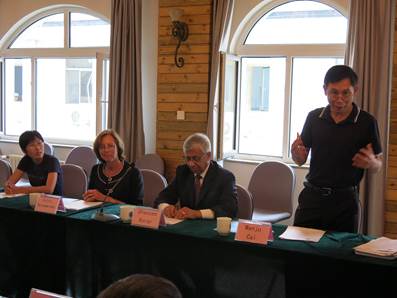On September 9, the delegation of CLIVAR/WCRP visited IOCAS, including the director of WCRP Dr. Ghassem Asrar, WCRP IPO Sr. scientific officer Dr. Valery Detemmerman, and CLIVAR/WCRP Pacific Panel co-chair Dr. Wenju Cai, accorded a cordial reception by deputy director of IOCAS Dr. Hui Wang, two academicians Dr. Dunxin Hu and Dr. Mu Mu together with directors from relative departments.
World Climate Research Programme (WCRP) is an important international project, under the joint sponsorship of the International Council for Science (ICSU), the World Meteorological Organization (WMO) and the Intergovernmental Oceanographic Commission (IOC). Hosted by Hui Wang, the meeting started with Ghassem Asrar’s report, entitled ‘World Climate Research Programme-Climate Research in Service to Society’. He introduced new WCRP structure, vision and imperatives, pointing out its efforts to coordinate international climate research to improve. Six grand scientific challenges were elaborated upon regional information, climate sensitivity, water availability, and cryosphere, etc. He placed great significance on international cooperation and coordination, only with which can these challenges be transformed. More collaboration with IOCAS is highly expected from WCRP to bring together scientists and share resource internationally.
Dr. Dongliang Yuan gave a brief report to introduce IOCAS and Key Laboratory of Ocean Circulation and Waves (KLOCAW), involving organization, scientific research, faculty, education system, key programs.
Endorsed as an international joint program by CLIVAR/WCRP, NPOCE now is joined by 19 institutions expanding 8 countries, steered by 18 Scientific Steering Committee (SSC) members. As the chair of NPOCE SSC, Dunxin Hu delivered a speech about NPOCE progress in the last three years, with an emphasis on the breakthrough progress obtained in field experiments and observation. In terms of international cooperation, he analyzed the main process of joint programs like POSEIDON, GAIA, and JAMSTEC with Korea and Japan, etc., while national scientific program such as 973 and strategic priority project increased the support of western Pacific Ocean circulation and climate research. Having successfully hosted several international meetings, NPOCE exerted a broader influence and reinforced the international cooperation, which is also highly appreciated by Ghassem Asrar.


